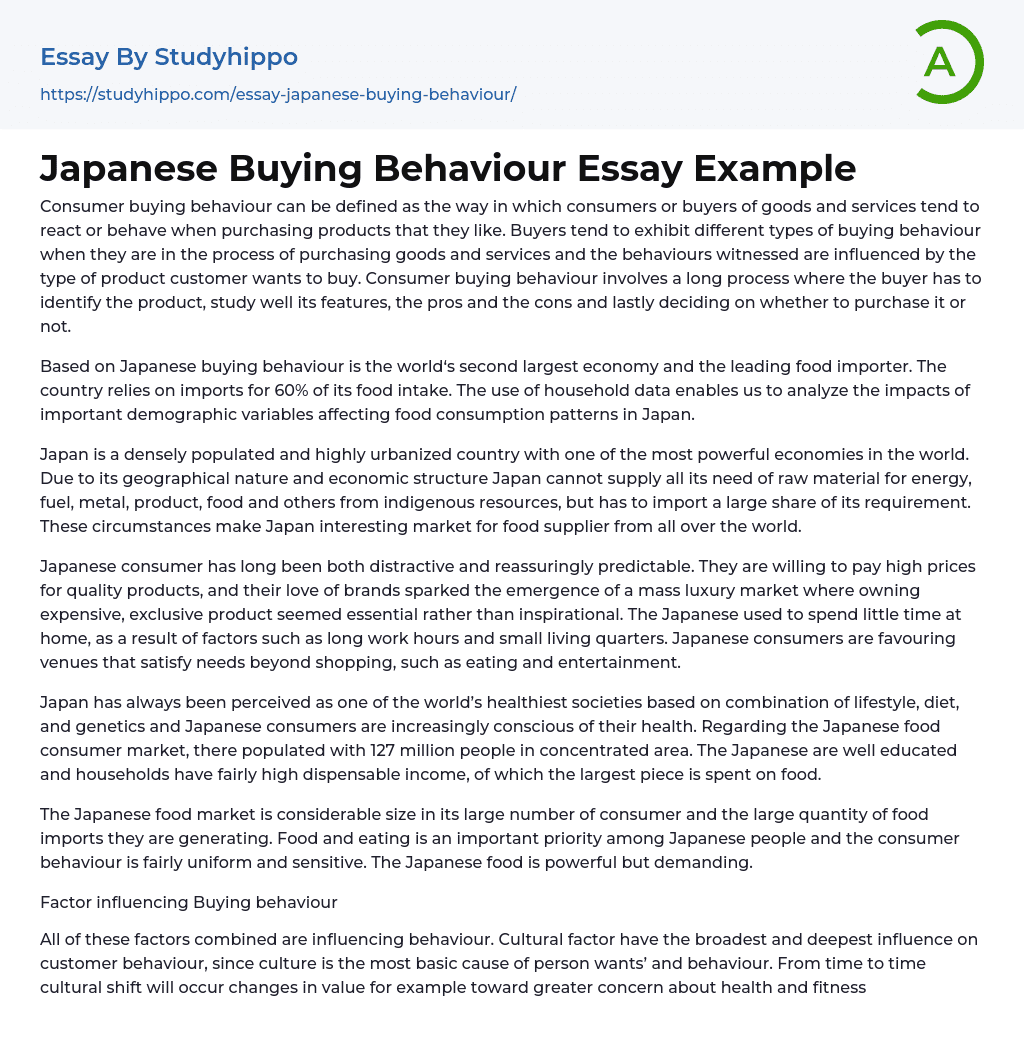Consumer buying behaviour can be defined as the way in which consumers or buyers of goods and services tend to react or behave when purchasing products that they like. Buyers tend to exhibit different types of buying behaviour when they are in the process of purchasing goods and services and the behaviours witnessed are influenced by the type of product customer wants to buy. Consumer buying behaviour involves a long process where the buyer has to identify the product, study well its features, the pros and the cons and lastly deciding on whether to purchase it or not.
Based on Japanese buying behaviour is the world‘s second largest economy and the leading food importer. The country relies on imports for 60% of its food intake. The use of household data enables us to analyze the impacts of important demographic variables
...affecting food consumption patterns in Japan.
Japan is a densely populated and highly urbanized country with one of the most powerful economies in the world. Due to its geographical nature and economic structure Japan cannot supply all its need of raw material for energy, fuel, metal, product, food and others from indigenous resources, but has to import a large share of its requirement. These circumstances make Japan interesting market for food supplier from all over the world.
Japanese consumer has long been both distractive and reassuringly predictable. They are willing to pay high prices for quality products, and their love of brands sparked the emergence of a mass luxury market where owning expensive, exclusive product seemed essential rather than inspirational. The Japanese used to spend little time at home, as
a result of factors such as long work hours and small living quarters. Japanese consumers are favouring venues that satisfy needs beyond shopping, such as eating and entertainment.
Japan has always been perceived as one of the world’s healthiest societies based on combination of lifestyle, diet, and genetics and Japanese consumers are increasingly conscious of their health. Regarding the Japanese food consumer market, there populated with 127 million people in concentrated area. The Japanese are well educated and households have fairly high dispensable income, of which the largest piece is spent on food.
The Japanese food market is considerable size in its large number of consumer and the large quantity of food imports they are generating. Food and eating is an important priority among Japanese people and the consumer behaviour is fairly uniform and sensitive. The Japanese food is powerful but demanding.
Factor influencing Buying behaviour
All of these factors combined are influencing behaviour. Cultural factor have the broadest and deepest influence on customer behaviour, since culture is the most basic cause of person wants’ and behaviour. From time to time cultural shift will occur changes in value for example toward greater concern about health and fitness that creates a demand for lower calories and natural foods and others health related to goods and services.
Furthermore, person behaviour is influenced also by many small groups, such as consumer family, friends and others. Family and friend have strongly influences the buyer. The family is very important consumer buying organization in society. Example on parents makes joint decisions and children is often influence the parent’s choice of product, and friend and other
social group are influencing a person buying behaviour in similar ways.
Buying behaviour are influenced by a variety of personal characteristic as well, such as the buyers age and life cycle stage, occupation, economic situation, lifestyle and many more. Young people perhaps buy more fast food than older people do. Moreover, the occupation and economic situation of a person may also affect product choice. Demands of income are dependent on trends in personal income, savings and interest rate. The psychographic factors are possible to identify the lifestyle of the person. The lifestyle is a pattern of living expressed in a person activities, interest and opinions. someone’s activities in work, hobbies and sports, interest in home, foods will to some extent influence the buying behaviour of that person.
On psychological factors a consumer buying choice are further influenced by psychological factors such as motivation, beliefs and attitude. People acquire their belief and attitude through doing and learning, and these can influence their buying behaviour. A belief is a descriptive idea that a person has about something for example is very delicious and contains ingredients of high quality.
- Perseverance essays
- Expressive essays
- Character Traits essays
- Apology essays
- Compassion essays
- Food Safety essays
- Food Security essays
- Beverages essays
- Cuisines essays
- Dairy essays
- Desserts essays
- Fast Food essays
- Bread essays
- Meal essays
- Meat essays
- Organic Food essays
- Rice essays
- Sugar essays
- Taste essays
- Beef essays
- Coconut essays
- Crowd essays
- Dinner essays
- Juice essays
- Sainsbury essays
- Cooking essays
- Ginger essays
- Oreo essays
- Drink essays
- Beer essays
- Wine essays
- Coffee essays
- Tea essays
- Cake essays
- Hamburger essays
- Ice Cream essays
- Burger essays
- Pizza essays
- Fruit essays
- Lemon essays
- Food Waste essays
- Favorite Food essays
- Alcoholic essays
- Soft Drinks essays
- Cookie essays
- Starch essays
- Yeast essays
- Cola essays
- Pizza Hut essays
- snack foods essays




